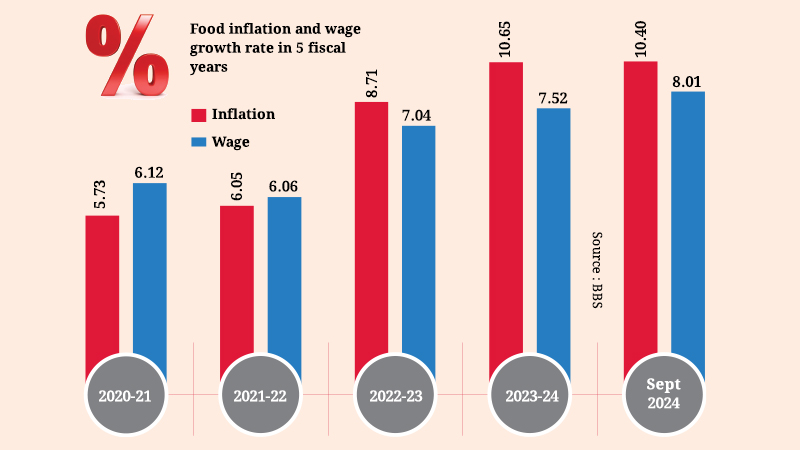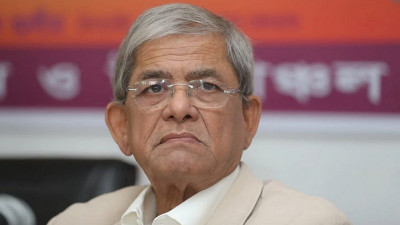 Photo: Bonik Barta
Photo: Bonik Barta Bilquis Begum works in a garment factory in Gazipur.
She started about five years ago as a helper with a salary of BDT 5000.
Gradually, she was promoted to operator, and now her salary is BDT 12,000. Her
husband's income as a security guard is nearly the same. Despite this, they
struggle to make ends meet. Almost half of their total income goes toward rent,
and they have the educational expenses of their three children. In this
high-inflation market, they rarely can afford fish or meat. Bilquis and workers
from nearby garment factories recently participated in protests demanding wage
increases and other rights. After assuring them that their demands would be
met, they returned to work.
Experts say that the increase in workers' wages is
significantly below the country's inflation rate. While private sector owners
have agreed to raise wages in response to workers' demands, the question
remains whether simply increasing wages is sufficient to address the current
labor unrest. This is because the essential goods market is not controlled, and
people's expenses are rising daily.
In September of this year, the food inflation rate in
the country was 10.40 percent, whereas the average wage increase for workers in
that month was only 8.01 percent. This trend is not limited to September; for
the past 32 months, wage increases have consistently fallen well below the
inflation rate. Additionally, food inflation often surpasses overall inflation.
As a result, the working-class people in the country are consuming less food
than necessary and cutting back on their demands to manage their living
expenses.
Worker representatives state that they are protesting
because they cannot sustain themselves in the rising price market. In this
regard, the government must take steps to control inflation and implement
rationing. Discussions about rationing have occurred, but no solutions have
emerged.
Industry stakeholders also argue that when worker
movements occur, owners are always blamed, and various conspiracy theories are
brought up. In reality, high inflation is the primary trigger for workers'
protests. Workers increasingly rely on rice and vegetables for their food, both
experiencing significant inflation.
Experts believe the disparity between high inflation
and low wage rates is a major issue. Government intervention is essential here.
If the government cannot initiate rationing or bring down inflation, owners
will not be able to resolve the problem simply by raising wages.
It has been observed that many private sector owners
have established arrangements similar to fair-price shops for their workers,
recognizing the pressure of inflation. However, economists believe such
indirect measures are insufficient to solve the problem. They argue that wage
increases through owners alone are not a solution, as this could further
increase inflation. Therefore, if inflation is not considered on a broad scale,
it will become challenging to bring labor unrest under control. While
increasing wages is undoubtedly necessary, concerns will remain regarding
whether worker dissatisfaction can be alleviated amid high inflation. Thus, to
reduce labor unrest, inflation must be curtailed.
Dr. Mustafa K Mujeri, Executive Director of the
Institute for Inclusive Finance and Development, told Bonik Barta, "I do
not believe that merely increasing wages without controlling inflation can
eliminate workers' dissatisfaction. If inflation continues, even if wages are
raised now, they will still be inadequate in six months, and this will not
change the standard of living. Therefore, it is essential to focus on
fulfilling workers' basic needs. Inflation must be controlled, and this must be
ensured not just for workers but all segments of society."
According to data from the Bangladesh Bureau of
Statistics (BBS), the average food inflation rate in the country for the fiscal
year 2020-21 was 5.73 percent. In that fiscal year, the annual wage increase
rate was 6.12 percent. The food inflation rate rose to 6.05 percent in the
following fiscal year, while the wage increase rate decreased to 6.06 percent.
For the fiscal year 2022-23, the average food inflation rate was 8.71 percent,
and the wage increase rate was 7.04 percent. In the fiscal year 2023-24, food
inflation increased further to 10.65 percent, but wages for laborers did not
increase accordingly. In the last fiscal year, the general wage increase rate
was 7.52 percent, which was 3.13 percent lower than inflation. In September of
this year, while food inflation was at 10.40 percent, the wage increase rate
was only 8.01 percent.
Moshrefa Mishu, General Secretary of the Democratic
Revolutionary Party and President of the Garment Workers Unity Forum told Bonik
Barta, "The government should take strong measures on two fronts:
rationing and reducing commodity prices. If these can be implemented, no matter
how many conspiracy theories arise, they won't matter. If done properly, these
measures could significantly impact workers' intolerance. The existing
dissatisfaction among workers could remain at a manageable level."
She added, "As representatives of the working
class, we demand and have stated that rationing should be implemented
nationwide, starting from Dhaka and in every industrial area. Workers are also
asking for this. If rationing occurs, it could relieve low-income and
working-class people. This measure should be implemented without delay, as it
would help alleviate inflation pressure on them."
It has been two months since this government took
office, and the price of coarse rice in the market ranges from BDT 60 to 65 per
kilogram. Onions are priced at 140 taka. Unfortunately, we are witnessing this
state of commodity prices, which is on the rise. People are falling into an
uncertain situation. It is quite alarming that the government is unable to
control the market. This is currently the biggest limitation of the present
government, and we believe it may lead to even more difficult circumstances.
Tasleema Akhter, President of the Bangladesh Garment
Workers Solidarity Central Committee, expressed optimism about the environment
in which workers can assert their demands compared to before. She noted many
measures to be taken, including accepting workers' demands and controlling the
situation, which have not been seen recently.
Tasleema Akhter told Bonik Barta, "Inflation is
the trigger point in this case. However, it is necessary to evaluate whether
the assumption that inflation is the sole reason for the prolonged protests is
complete. While inflation serves as a trigger point, it is also being used
intentionally to spread death rumors."
Recently, among the 18 demands accepted by all
parties, workers called for the reconstitution of the wage board to redefine
the minimum wage for workers. The government-declared minimum salary for 2023
that has not yet been implemented in factories must be enforced promptly. Labor
laws need to be amended. If a worker is dismissed after completing five years
of service, they should receive a payment equal to one basic salary,
necessitating amendments to Section 27 of the Labor Law and other related
provisions. All outstanding wages must be paid immediately.
Attendance bonuses (BDT 225), lunch allowances (BDT
50), and night shift allowances (BDT 100) should be uniformly increased across
all factories. A provident fund system must be established in all factories.
The annual increment against salaries should be set at a minimum of 10 percent.
A rationing system for workers should be implemented. Biometric blacklisting
regulated by the BGMEA should be prohibited; the biometric list must remain
under government control. All forms of harassment and political cases must be
withdrawn. Measures should be taken to end the dominance of the scrap business,
and legislation should be enacted if necessary.
Employment must be provided without discrimination in
factories. Compensation and medical services must be ensured for the workers
who were martyred and injured during the July uprising. Appropriate measures
should be taken for the welfare of those affected by the Rana Plaza and Tazreen
Fashions disasters after thorough investigations. Day-care centers must be
established in all factories according to labor laws. Unjust layoffs of workers
must be stopped. The maternity leave period for female workers should be set at
120 days.
Officials related to the government state that the
prolonged inflation is a significant issue. This is not just a concern for
garment industry workers; the general public also faces high prices. The
previous government failed to control this issue, increasing solidarity among
protest movements. Due to rising prices, a significant part of the protests has
been driven by negative sentiments towards the government. This has been
essential for people from all walks of life, including the working class, to
take to the streets. The current nature of labor unrest indicates dynamics at
play beyond just inflation.
AHM Shafiquzzaman, Secretary of the Ministry of Labor
and Employment, told Bonik Barta, “Every worker demand has been considered.
Arrangements for TCB (Trading Corporation of Bangladesh) products have already
been made. TCB products will be provided to 4 million workers. This program was
supposed to be inaugurated on the 1st. However, after accepting the 18 demands,
the inauguration could not be completed when discontent began. I have been held
at the Labor Ministry every day until night for other work. Will keeping the
Labor Secretary locked up solve the issue? No one is allowing us to work. Those
surrounding the Labor Ministry have not received any wages for a year and a
half to three years because they have been out of work since three years ago.
They are now surrounding the Labor Ministry and blocking the Mymensingh Road
with those demands. A decision has been made to provide support to the closed
factories. Even after that, will the workers return to work? There are many
dimensions to this situation. The workers are not organized and united. There
are problems, but can their rights be fixed overnight? Restoring a proper
environment will not be solved overnight.”
Representatives of the owners have expressed their
inability to speak publicly, stating that even after accepting the 18 demands,
problems remain unresolved because politics has entered the realm of
discontent. The nature of this situation is such that, at this moment, no
immediate solution can be found except to continue efforts for resolution.
Abdullah Hil Rakib, the acting president of the
Bangladesh Garment Manufacturers and Exporters Association (BGMEA), told Bonik
Barta, “All parties involved are sincerely trying to find a sustainable
solution to the problems. I hope we will succeed.”






